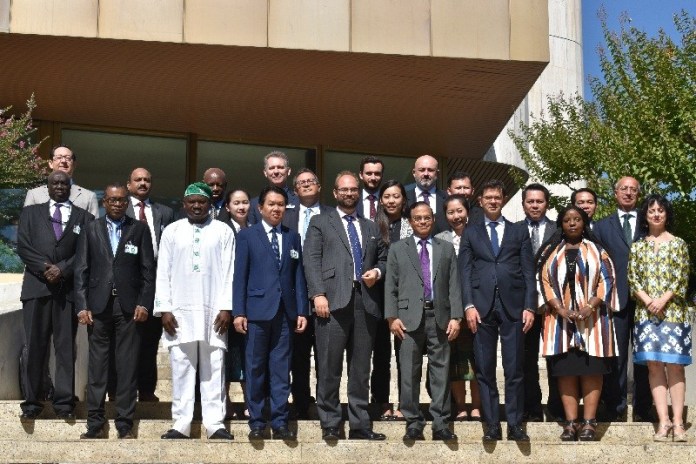Sri Lanka says it remains committed to achieve tangible results in humanitarian disarmament.
The 9th Meeting of States Parties (MSP) to the Convention on Cluster Munitions (CCM) concluded its deliberations in Geneva on 4 September 2019 under the Presidency of Sri Lanka. States parties, signatories, observer states and international and civil society organizations participated in the three-day meeting which convened its first session on 2 September 2019, a statement from Sri Lanka’s Permanent Mission to the UN in Geneva said today.
The MSP, chaired by Ambassador A.L.A. Azeez, Sri Lanka’s Permanent Representative to the UN in Geneva, marked the culmination of a year-long process of oversight and review of the implementation of the Convention on Cluster Munitions and of guidance and advocacy for the universalization of the Convention and its norms, and the prohibition of use, production, stockpile and transfer of cluster munitions.
Sri Lanka’s election to the Presidency of the 9th MSP had been facilitated by the wide recognition among the international community, of its strengthened commitment to humanitarian disarmament, as manifested by its accession to the CCM and the Anti-Personnel Mine Ban Convention (APMBC) in 2017 and 2018 respectively.
During Sri Lanka’s Presidency, a number of progressive measures were taken to advance the key objectives of the Convention. Universalization of the Convention and its norms, Risk Reduction Education and Transparency Reporting constituted its main focus, while progress on other thematic areas including Clearance, Stockpile Destruction and Retention, International Cooperation and Assistance, and Victim Assistance was also achieved.
Ambassador Azeez, as the President of the Meeting of States Parties, guided these efforts, supported by the Coordination Committee and the Implementation Support Unit of the CCM, as well as the UN Office for Disarmament Affairs, and other stakeholders.
Sri Lanka’s engagement with states parties and non- state parties contributed towards building consensus on several critical issues in the area of humanitarian disarmament. Following the universalization efforts undertaken, the Convention was further strengthened with the addition of two new states parties, Gambia and the Philippines.
States parties and observer states, in their national statements, appreciated Sri Lanka’s leadership to the convention processes immediately following its accession to the Convention in 2018, recalling Sri Lanka’s long-held tradition of steering disarmament processes in the multilateral fora. The initiative taken by Sri Lanka to facilitate the adoption of the 2018 UN General Assembly resolution 73/54 titled “Implementation of the Convention on Cluster Munitions” also received appreciation.
The meeting commended Botswana and Switzerland on completion of their Article 3 obligations ahead of deadlines, and expressed concern regarding evidence of use of cluster munitions in recent times in different parts of the world, while noting that the worldwide use of cluster munitions has declined considerably.
Upon consideration of analyses conducted, the meeting also approved the extension of deadlines for Bulgaria, and Germany and Lao PDR to complete their obligations under Articles 3 and 4 of the Convention respectively.
Ambassador Felix Baumann, Permanent Representative of Switzerland to the Conference on Disarmament, presented to Ambassador Azeez the Certificate of Compliance issued by the Swiss authorities confirming the fulfillment by Switzerland of all the clearance and destruction requirements under the Convention.
The states parties decided to designate Switzerland as the President of the Second Review Conference of the CCM to be held in 2020 and the United Kingdom as the President of the Tenth MSP of the Conference to be held in 2021.
The incoming Presidents joined other state parties and stakeholders in praising Sri Lanka’s leadership to the Meeting of the State Parties and the facilitation of the process of consultations that resulted in the adoption of the outcome document by consensus.
Following the conclusion of the meeting, Switzerland received the flag of the Convention from Sri Lanka – an act symbolizing the change of presidency.
The delegation of Sri Lanka, participating in its national capacity, had made interventions under the themes of Universalization and Risk Reduction Education. It was stressed that the decision to accede to the CCM in March 2018 was a strong manifestation of Sri Lanka’s commitment and perseverance to achieve tangible results in humanitarian disarmament, with the Sri Lanka military leading the initiative that led to this decision.
Sri Lanka also updated the meeting on its compliance with the reporting requirements under the convention and the process being undertaken to explore the adequacy of existing legal provisions to effectively implement the Convention nationally. It was also highlighted that the significant progress achieved by Sri Lanka in mine clearance has strengthened confidence in the country’s continuing pursuit of humanitarian disarmament.
The CCM is a humanitarian imperative-driven legal instrument which prohibits all use, production, transfer and stockpiling of cluster munitions, in view of the inability to distinguish between civilians and combatants and the number of dangerous unexploded ordnance that they leave behind with the potential to kill and injure civilians, obstruct economic and social development, and have other severe consequences that persist for years and decades after use.
The delegation of Sri Lanka to the MSP included Ms. Dayani Mendis, Deputy Permanent Representative, Brigadier Jagath Kodithuwakku, Military Liaison Officer of the Ministry of Defence, and officers of the Permanent Mission of Sri Lanka to the UN in Geneva.
(Colombo Gazette)

